|
Books Should Be Free Loyal Books Free Public Domain Audiobooks & eBook Downloads |
|
|
Books Should Be Free Loyal Books Free Public Domain Audiobooks & eBook Downloads |
|
Religion |
|---|
|
Book type:
Sort by:
View by:
|
By: St. Benedict of Nursia (ca. 480-547) | |
|---|---|
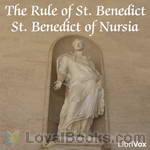 The Rule of St. Benedict
The Rule of St. Benedict
The Rule of Saint Benedict (Regula Benedicti) is a book of precepts written by St. Benedict of Nursia for monks living communally under the authority of an abbot. Since about the 7th century it has also been adopted by communities of women. During the 1500 years of its existence, it has become the leading guide in Western Christianity for monastic living in community. The spirit of St Benedict's Rule is summed up in the motto of the Benedictine Confederation: pax ("peace") and the traditional ora et labora ("pray and work").(Introduction from Wikipedia) | |
By: J. C. Ryle (1816-1900) | |
|---|---|
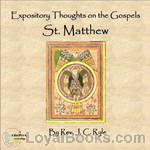 Expository Thoughts on the Gospels - St. Matthew
Expository Thoughts on the Gospels - St. Matthew
“Expository Thoughts” divides the Gospels into sections of about twelve verses each, from which J. C. Ryle selects two or three prominent points to dwell on and bring to the reader’s attention. In Ryle’s day, there were many detailed commentaries and expositions on scripture. In writing these “Expository Thoughts”, Ryle aimed to offer a resource to the laity for use in family prayers, as an aid to those who visit the sick and desire a proper book to read on such occasions, and for private devotions for those whose callings and engagements make it impossible for them to read large commentaries... | |
By: Anonymous | |
|---|---|
 The Cloud of Unknowing
The Cloud of Unknowing
The Cloud of Unknowing (Middle English: The Cloude of Unknowyng) is an anonymous work of Christian mysticism written in Middle English in the latter half of the 14th century. The text is a spiritual guide on contemplative prayer in the late Middle Ages. The book counsels a young student to seek God, not through knowledge and intellection (faculty of the human mind), but through intense contemplation, motivated by love, and stripped of all thought. This is brought about by putting all thoughts and desires under a "cloud of forgetting", and thereby piercing God's cloud of unknowing with a "dart of longing love" from the heart... | |
By: Jewish Publication Society of America (1917) | |
|---|---|
 Genesis (JPSA)
Genesis (JPSA)
The first book of the Pentateuch - Genesis. Presented according to weekly parshah.Praised are You, Adonai, Our G-d, ruler of the Universe, who has made us holy with commandments and commanded us to engage in the study of Torah. | |
By: Thomas Whittaker (1856-1935) | |
|---|---|
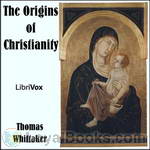 The Origins of Christianity
The Origins of Christianity
The full title of this book is The Origins of Christianity with an Outline of Van Manen’s Analysis of The Pauline Literature. Willem Christiaan van Manen (1842-1905) was a Dutch theologian. The vast majority of van Manen’s radical criticism of the New Testament and Christian origins has never been translated into English.In this book, Thomas Whittaker outlines the arguments of van Manen for an English-speaking audience. Van Manen’s work is not now generally known, but his views obtained notoriety by the articles and books that he wrote, in which he maintained that none of the Epistles that bear the Apostle Paul’s name were in fact written by him... | |
By: Louis Laravoire Morrow (1892-1987) | |
|---|---|
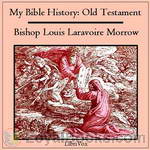 My Bible History: Old Testament
My Bible History: Old Testament
A short, simple Old Testament Bible History for children, but which can also be enjoyed by adults alike. Starting with Creation, the sections cover Adam and Eve, Abraham, Moses, etc. up to the promise of a Redeemer. The same format continues in the volume that follows - My Bible History: New Testament - by the same author. | |
By: Carlo Giuseppe Quadrupani (1740-1807) | |
|---|---|
 Light and Peace: Instructions for Devout Souls to Dispel Their Doubts and Allay Their Fears
Light and Peace: Instructions for Devout Souls to Dispel Their Doubts and Allay Their Fears
Padre Quadrupani was an Italian priest and member of the Clerics Regular of St. Paul, also known as the Barnabites, from their association with St. Barnabas Catholic Church in Milan, Italy. Quadrupani's spirituality is based on that of the illustrious Doctor of the Church, St. Francis de Sales (1567-1622). Like St. Francis, the Padre offers spiritual advice that is practical and balanced. Perhaps it is owing to this that Quadrupani's treatise has been so well received by Catholic laypersons and has been recommended by numerous bishops over the years... | |
By: Charles H. Spurgeon (1834-1892) | |
|---|---|
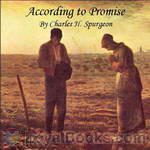 According to Promise, or The Lord’s Method of Dealing with His Chosen People
According to Promise, or The Lord’s Method of Dealing with His Chosen People
Charles Haddon (C.H.) Spurgeon (19 June 1834 – 31 January 1892) was a British Particular Baptist preacher and is still known today as the "Prince of Preachers". He was a strong figure in the Reformed Baptist tradition, defending the Church in agreement with the 1689 London Baptist Confession of Faith understanding, and opposing the liberal and pragmatic theological tendencies in the Church of his day. In his lifetime, Spurgeon preached to around 10 million people, often up to ten times each week at different places... | |
By: Louis Laravoire Morrow (1892-1987) | |
|---|---|
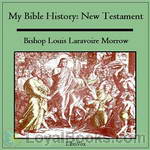 My Bible History: New Testament
My Bible History: New Testament
A short, simple New Testament Bible History for children, but which can also be enjoyed by adults alike. Starting with St. John the Baptist, and running through the beginning years of the Church, the sections cover Our Lord's birth, public life, miracles, death, resurrection and more. This is the companion volume to My Bible History: New Testament - by the same author. | |
By: Alban Butler (1711-1773) | |
|---|---|
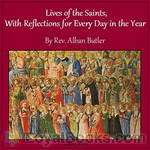 Lives of the Saints, With Reflections for Every Day in the Year
Lives of the Saints, With Reflections for Every Day in the Year
Compiled from the much larger 12 book set of "Butler's Lives of the Saints", this volume contains short biographies of the Saints, for each day of the year, followed by a reflection for each entry. | |
By: Winfrid Herbst | |
|---|---|
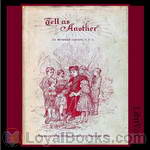 Tell Us Another! Stories That Never Grow Old
Tell Us Another! Stories That Never Grow Old
A collection of 65 little stories for the Catholic child (and adult), designed to captivatingly teach the truths and morals of the faith. This is the companion volume to "Just Stories" by the same author. | |
By: Saint Francis de Sales (1567-1622) | |
|---|---|
 Of the Love of God
Of the Love of God
Francis de Sales (1567-1622), Bishop of Geneva from 1602, was a renowned spiritual director who produced two classic guidebooks for earthly wayfarers on their spiritual journey to God: Introduction a la vie devote (Introduction to the Devout Life, 1609) and Traite' de l'amour de Dieu (Treatise on the Love of God, or Of the Love of God, 1616). In the Introduction to the Devout Life, Francis shows how anyone, whatever his or her calling or station in life, can strive for and achieve a life a piety and devotion to God... | |
By: St. John Chrysostom (349-407) | |
|---|---|
 Commentary on Galatians
Commentary on Galatians
St. Chrysostom’s Commentary on the Epistle to the Galatians is continuous, according to chapter and verse, instead of being arranged in Homilies, with a moral or practical application at their close, as in his exposition of other Epistles. It was written in Antioch, as Montfaucon infers from a reference which the Author, makes upon Chap. i., ver. 16 to other of his writings, which certainly were written about the same time in that city. (Introduction from the preface by John Henry Newman) | |
By: Hermann Gunkel | |
|---|---|
 The Legends of Genesis
The Legends of Genesis
The Legends of Genesis is the English translation of the introduction to Gunkel’s massive commentary, Genesis. Gunkel uses form critical analysis on the text of Genesis to determine the various genres of the biblical legends and their significance to the authors. Gunkel also uses form criticism to uncover buried clues as to the constituent sources of the text. Gunkel offers his hypothesis to explain how the various sources came to be combined and redacted, and how the text later came to be attributed to Moses. | |
By: Unknown | |
|---|---|
 Three Ecumenical Creeds
Three Ecumenical Creeds
MANUAL OF SURGERY, OXFORD MEDICAL PUBLICATIONSBY ALEXIS THOMSON, F.R.C.S.Ed.PREFACE TO SIXTH EDITION Much has happened since this Manual was last revised, and many surgical lessons have been learned in the hard school of war. Some may yet have to be unlearned, and others have but little bearing on the problems presented to the civilian surgeon. Save in its broadest principles, the surgery of warfare is a thing apart from the general surgery of civil life, and the exhaustive literature now available on every aspect of it makes it unnecessary that it should receive detailed consideration in a manual for students... | |
By: Ludwig Feuerbach (1804-1872) | |
|---|---|
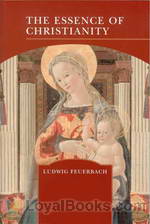 The Essence of Christianity
The Essence of Christianity
Taking issue with Hegel’s sense that God, as Logos, is somehow central to all that is, Feuerbach explores his own notion that Christianity, as religion, grew quite naturally from ordinary human observation. Only upon deeper, systematic reflection did people postulate a divine source–God. Religious teaching which loses sight of its own essential rootedness in human experience runs the risk becoming overly abstract, disconnected even, from realities which shape humanity and which impart meaning and dignity to life... | |
By: Martin Luther (1483-1546) | |
|---|---|
 The Bondage of the Will
The Bondage of the Will
On the Bondage of the Will (Latin: 'De Servo Arbitrio', literally, "On Un-free Will", or "Concerning Bound Choice"), by Martin Luther, was published in December 1525. It was his reply to Desiderius Erasmus's De libero arbitrio diatribe sive collatio or On Free Will, which had appeared in September 1524 as Erasmus's first public attack on Luther, after being wary about the methods of the reformer for many years. At issue was whether human beings, after the Fall of Man, are free to choose good or evil. The debate between Luther and Erasmus is one of the earliest of the Reformation over the issue of free will and predestination. | |
By: Andrew Murray (1828-1917) | |
|---|---|
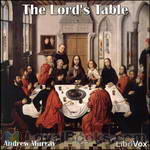 The Lord's Table
The Lord's Table
Murray suggests that his devotional, The Lord's Table, is not meant to replace scripture, but rather to strengthen believers' appreciation of God's word. Murray's meditations provide a thoughtful guide for believers who desire to develop a deeper understanding of the Lord's Holy Supper. The devotional covers the week before, during, and after the Supper, and each entry is labeled with the day of the week so that readers can manage devotions with ease. Murray first explains how believers can prepare to receive God's blessing during the weeks before the Supper... | |
By: Various | |
|---|---|
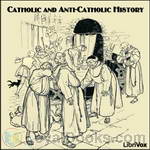 Catholic and Anti-Catholic History
Catholic and Anti-Catholic History
G.K. Chesterton and James Walsh join Hilaire Belloc in an energetic rollout of the means by which history becomes propaganda, to the damage, not only to truth, but to the human soul. | |
By: Charles H. Spurgeon (1834-1892) | |
|---|---|
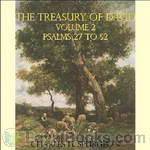 The Treasury of David, Vol. 2 (Abridged)
The Treasury of David, Vol. 2 (Abridged)
Charles Spurgeon was a British Particular Baptist preacher who remains highly influential among Christians of different denominations, among whom he is still known as the “Prince of Preachers”. In his lifetime, Spurgeon preached to around 10,000,000 people, often up to 10 times each week at different places. He was the pastor of the congregation of the New Park Street Chapel (later the Metropolitan Tabernacle) in London for 38 years.Spurgeon was a prolific author of many types of works. His accessible commentaries on the Psalms are a combination of meditation and teaching and are appropriate for anyone wanting to understand these familiar poems on a deeper level... | |
By: Rev. Gerald T. Brennan | |
|---|---|
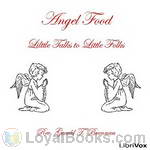 Angel Food: Little Talks to Little Folks
Angel Food: Little Talks to Little Folks
"Angel Food" consists of a series of short sermons for children on the truths of the Catholic Faith - but told with engaging stories, in a style and simple language that children can understand.The author was a parish priest in New York for many years during the mid 1900's. He was the author of several books for children, the most well known being the books in what is considered the "Angel Food" series. | |
By: Catherine of Genoa | |
|---|---|
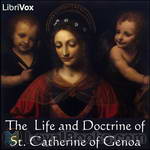 The Life and Doctrine of St. Catherine of Genoa
The Life and Doctrine of St. Catherine of Genoa
Saint Catherine of Genoa (Caterina Fieschi Adorno, born Genoa 1447 – 15 September 1510) is an Italian Roman Catholic saint and mystic, admired for her work among the sick and the poor. She was a member of the noble Fieschi family, and spent most of her life and her means serving the sick, especially during the plague which ravaged Genoa in 1497 and 1501. She died in that city in 1510.In 1551, 41 years after her death, a book about her life and teaching was published, entitled Libro de la vita mirabile et dottrina santa de la Beata Caterinetta de Genoa... | |
By: Hippolytus of Rome (170-235) | |
|---|---|
 Treatise on Christ and Antichrist
Treatise on Christ and Antichrist
In this late second century treatise, Hippolytus gives an excellent summary of Early Christian thinking on the subject of the antichrist. Familiar texts from Daniel and Revelation are treated together with his own current events to give a unique perspective. (Summary by Jonathan Lange) | |
By: Hannah Whitall Smith (1832-1911) | |
|---|---|
 The God of All Comfort
The God of All Comfort
This book is written to Christians who profess to believe the Bible as God's revelation, but whose "lives are filled with discomfort and unrest." Smith aims to show that the Bible's claim that God is the "the God of all comfort" is not an over-advertisement or misunderstanding, but that it is possible to avail ourselves of the doubts and heavy anxieties that plague so many Christians.By explaining God's part and man's part, Smith aims to show her readers that it is possible to overcome feelings of defeat and despair and find rest and peace in Christ... | |
By: Pansy | |
|---|---|
 Mag and Margaret: A Story for Girls
Mag and Margaret: A Story for Girls
Little Mag Jessup is an orphan girl who works hard as a servant in Mrs. Perkins' boarding house to earn her keep. She has no education, except what she has picked up on her own. Her future looks unchanging until she is given, on a whim, a devotional book called "Little Pillows," in which she learns that she is valuable to God as His child. She endures trials from many fronts and the prejudice of haughty, rich Margaret, with whom she has more in common than she thinks, on her journey with God. (Introduction by TriciaG) | |
 Tip Lewis and His Lamp
Tip Lewis and His Lamp
Tip Lewis is a mischievous, unpromising scamp. One Sunday, a visiting Sunday school teacher tells his mission class how her minister had grown up in similarly bad circumstances, but had decided to follow God and had never regretted it. Tip decides to try to BE somebody, like that minister did. He is given a Bible - his lamp - to use as a guide, and from there, his life begins to change. (Introduction by TriciaG) | |
By: Henry Scougal (1650-1678) | |
|---|---|
 The Life of God in the Soul of Man
The Life of God in the Soul of Man
Henry Scougal was born in Scotland in 1650. The son of the Bishop of Aberdeen, he flourished under rigorous teaching to become Professor of Philosophy at King's College, Aberdeen. In 1672, Scougal was ordained minister in Auchterless and, after a year, returned to King's College as Professor of Divinity. He continued in this office until his death in 1678.The Life of God in the Soul of Man is, in reality, a letter of doctrine and encouragement to a friend wavering in the faith, and was never intended for publication... | |
By: Andrew Murray (1828-1917) | |
|---|---|
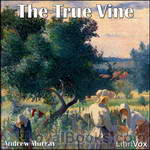 The True Vine
The True Vine
Andrew Murray's True Vine is a thirty-one day devotional focusing on Christ's Parable of the Vine and the Branches in John 15. The devotional for each day, though short, elaborates and expounds upon John 15, providing spiritual insight along the way. Murray repeats important themes--like abiding in Christ--throughout the different days. Noticing how they develop and grow with each successive read, countless small groups and individuals have found Murray's keen spiritual teachings fruitful. An excellent devotional, True Vine is recommended for daily spiritual nourishment. | |
By: Richard Sibbes (1577-1635) | |
|---|---|
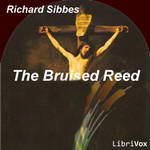 The Bruised Reed
The Bruised Reed
Richard Sibbes was a Puritan pastor and theologian in the 17th century. His best known work, The Bruised Reed, is based on a Scripture verse from Matt. 12:20: "A bruised reed shall he not break, and smoking flax shall he not quench, till he send forth judgment unto victory." Sibbes uses this text to respond to the despondent thoughts and fears that many Christians have. He draws a picture of Christ's gentleness and mercy for the Christians who feel themselves small and weak. The Bruised Reed is full of an amazing amount of soul-comfort... | |
By: Elizabeth Cady Stanton (1815-1902) | |
|---|---|
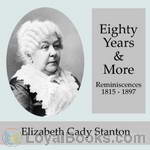 Eighty Years and More; Reminiscences 1815-1897
Eighty Years and More; Reminiscences 1815-1897
Elizabeth Cady Stanton was one of the premier movers in the original women’s rights movement, along with Susan B. Anthony, her best friend for over 50 years. While Elizabeth initially stayed home with her husband and many babies and wrote the speeches, Susan went on the road to bring the message of the women’s rights movement to an often hostile public. When black men were given the vote in 1870, Susan and Elizabeth led the women’s rights establishment of the time to withhold support for a bill that would extend to black men the rights still denied for women of all colors... | |
By: Charles Warren Stoddard (1843-1909) | |
|---|---|
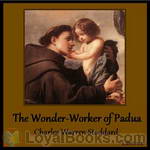 The Wonder-Worker of Padua
The Wonder-Worker of Padua
This is the inspiring story of Saint Anthony of Padua (1195-1231). The son of a wealthy Portuguese family, he was initially ordained a priest of the Canons Regular of Saint Augustine. In 1221, he took up the habit of a poor Franciscan friar and devoted his life to fervently preaching the Word of God. His extensive knowledge of Sacred Scripture and keen insights into its profound spiritual meaning astonished his hearers. To confirm the efficacy of his words, God gave him the gifts of prophecy and of performing miracles, the most memorable of which he worked in Padua in northern Italy, where he resided for many years... | |
By: Thomas Cooper (1805-1892) | |
|---|---|
 The Bridge of History Over the Gulf of Time: A Popular View of the Historical Evidence for the Truth of Christianity
The Bridge of History Over the Gulf of Time: A Popular View of the Historical Evidence for the Truth of Christianity
Written by the former skeptic, poet, and scholar, Thomas Cooper, The Bridge of History Over the Gulf of Time admirably sets forth a winsome defense of Christianity. Written as the substance of fourteen years of lectures, at the request of his hearers, Cooper leads his reader across the bridge of history, through the centuries, tracing Christianity. At last, he addresses "Leben Jesu" by Dr. David Friedrich Strauss, discusses the historicity of the four Gospels, and offers some concluding evidences for the truth of Christianity. (Introduction by tzieger) | |